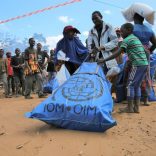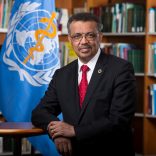Mozambique: Food, aid arrives for thousands fleeing Chiúre
Mozambique: More than 50 people victims of human trafficking in two years

The Mozambican authorities have identified around fifty victims of human trafficking in two years, most of them for forced labour, according to data released on Tuesday by the United Nations.
According to the United Nations Office on Drugs and Crime (UNODC) overall report on trafficking in human beings, between 2018 and 2019, the Mozambican Attorney General’s Office registered 51 victims of trafficking in human beings, 29 in 2018 and 22 in 2019.
Of these, 36 were trafficked for forced labour, nine for sexual exploitation and three for financial gain, and there was no information on the motivations of the remaining cases.
According to the Attorney General’s Office, between 2018 and 2019, 47 victims of human trafficking were identified as being Mozambican, 29 men and 18 women.
In the same period, one Rwandan female victim was identified.
During the same period, the Mozambican authorities reported two convictions and 15 cases of human trafficking.
Thirty-five suspected human traffickers were identified, 34 of whom were Mozambicans and one was from South Africa.
The report also presented data on human trafficking in Angola, Cabo Verde and Guinea-Bissau, but the records cited are older.
In the case of Angola, the data is for 2017 and 2018 and shows the registration in the country of 31 victims, 26 in 2017 and 5 in 2018, mostly men and boys trafficked for labour exploitation.
Eleven suspected human traffickers for forced labour, including seven Angolans and two from Namibia, were identified and sentenced.
In Guinea-Bissau, the figures cited show 106 cases between 2016 and 2017, when 284 human trafficking cases were opened.
During the same period, most of the victims of human trafficking identified were young men of the Fula ethnic group from the Bafata and Gabu region.
The majority of the victims identified were trafficked for forced labour, begging and sexual exploitation.
Between 2016 and 2017, victims of trafficking in children from Guinea-Bissau were detected in Senegal, according to the report, which bases the information on the 2018 annual report on trafficking in persons of the Economic Community of West African States (ECOWAS).
According to the UNODC report, the authorities of Cabo Verde did not identify any victims of trafficking in human beings during 2017 and 2018.
In the sub-Saharan African region, children represent the majority of victims detected (around 60%), especially in West Africa, which recorded 2,553 child victims of trafficking in 2018, 1,389 boys and 1,164 girls.
Southern and East African countries tend to detect more adults.
During this period, 4,799 victims of trafficking in human beings were detected in 26 sub-Saharan African countries.
The majority of victims detected are trafficked for forced labour (77%), with trafficking for sexual exploitation accounting for 20% of victims.
Flows out of sub-Saharan Africa have a global dimension, with victims detected in Western and Southern Europe, North Africa and the Middle East, but also North America and East Asia.
Nevertheless, most victims in this sub-region are trafficked within their own countries or across borders with neighbouring countries.
The majority of traffickers in this sub-region remain men (66% compared to 34% of women), in proportions similar to overall standards.
West African countries reported the highest percentage of women investigated and convicted of trafficking.
Conversely, Eastern and Southern African countries reported higher percentages of male offenders.
By origin, 78% of traffickers are nationals of the countries where they have been convicted, while 22% are foreigners from another country in the subregion.
Overall, the report, which analysed data from 148 countries, found that the percentage of children identified as victims of trafficking has tripled in the past 15 years, with males registering five times more.
The report released by the United Nations Office on Drugs and Crime also points out, despite compiling concrete data for 2018 and in some cases 2019, that the current Covid-19 pandemic has exacerbated the upward trend in trafficking in human beings.













Leave a Reply
Be the First to Comment!
You must be logged in to post a comment.
You must be logged in to post a comment.